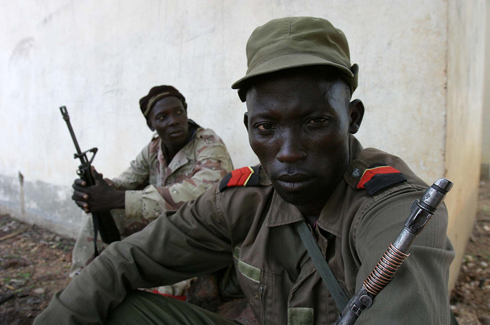
On January 11, the Central African Republic (CAR) government, led by President François Bozizé, and the rebel coalition Séléka signed a new peace deal. The agreement comes after a month of political and military instability that saw rebels advance on the capital Bangui in an attempt to overthrow Bozizé during a military advance. It is expected that the peace deal will result in the naming of new a prime minister and the formation of a government of national unity. According to Centrafrique Presse Info, President Bozizé is expected to respect the decision to appoint Nicolas Tiangaye, [fr] a lawyer and former president of the Central African Human Rights League, as the country’s new prime minister.
Questions over Séléka’s supporters
Despite the rebels’ attempts to seize control of an important region of the CAR, little is known about Séléka and its coalition partners. L’Observateur [fr], for example, raises the following questions:
Who is behind this rebellion? Where does it come from? Where does it get its money from?
For some analysts, such as Thierry Vircoulon, a researcher at the International Crisis Group (ICG), Central African insurgents enjoy significant logistics and probably political support from Chad. (…)
This country has been for the past ten years the protector of the CAR. The release from N’Djamena jails in the past months of several opponents today in the ranks of Séléka supports such suspicion. As well as the passivity shown in recent days by the Chadian interposition force dispatched to Sibut, a barrier located a hundred kilometers from Bangui.
A Wikieaks cable by the US embassy in Bangui from 2009 confirms suspicions of the involvement of Chad in supporting the rebels. However, Séléka has always denied being supported by a foreign power, a stance that it reaffirmed as recently [fr] as January 1. These declarations, however, have not stopped President Bozizé from accusing the coalition of being manipulated by outside actors.
African Mobilization
The renewed violence prompted a host of African states to redeploy troops in support of MICOPAX [fr], the peacekeeping operation in CAR led by the Economic Community of Central African States. On January 6 South Africa announced that they were also sending 400 troops to the CAR, a decision that was criticized [fr] by the country’s opposition. Pretoria’s decision nevertheless reflects that South Africa has a history of providing military to support to the CAR. In 2006, for example, the US Embassy in Pretoria revealed that South Africa had agreed to provide military training and assistance to the CAR on the basis that stability in this region is important to the country’s wider interests.
Yet in an opinion piece [fr] published on Le Plus Nouvel Obs, Florence Gabay, Vice-President of the Robert Schuman Institute for Europe, suggests that such mobilization represents a turning point for conflict resolution in this part of Africa:
It is interesting to note that the soothing strength here is an economic strength, the ECCAS (Economic Community of Central African States). It is a fact full of meaning: Benjamin Constant famously described how trade tended increasingly to replace armed conflict. Africa is showing clear signs of it: Peace is not done first in the name of abstractions, in the name of ideals, however noble they may be, but it is done in the name of economic interests.
Solid Ground for a Sustainable Peace?
However, some of observers question the ability of this new deal to bring a sustainable peace to the CAR. Survie, a French Non-Governmental Organization (NGO) that is critical of the ‘Françafrique system’ published an article claiming that the CAR remains ‘terminally ill’ [fr]. Its author, Raphaël de Benito, argues that conditions for the next crisis are ripe:
This agreement will not satisfy anyone: Bozizé will stay in power until the end of his mandate, flung with a prime minister from the civil opposition, while the Séléka returns empty-handed, to the chagrin of its military chiefs, who control most of the country.
For additional reading on this topic please see:
Central African Republic: Peacebuilding Without Peace
Reintegrating Ex-Combatants in the Great Lakes Region
Central African Republic: Keeping the Dialogue Alive
For more information on issues and events that shape our world please visit the ISN’s featured editorial content and Security Watch.

